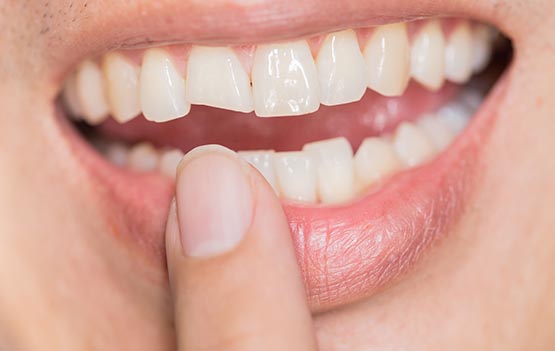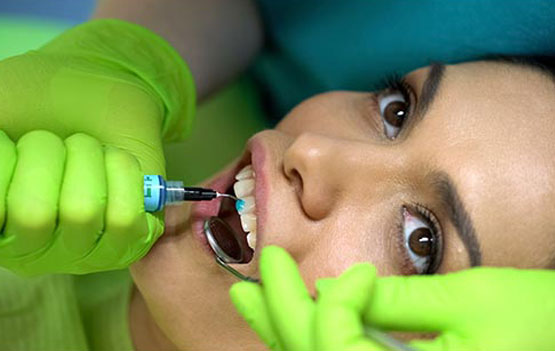Chipped & Broken Tooth Treatment Gainesville, FL
Let Us Help Restore A Beautiful Smile.
Schedule Appointment
Let Us Help Restore A Beautiful Smile.
Schedule Appointment
The enamel on your teeth is highly durable, yet it can become vulnerable to chipping, cracking, and even breaking. Teeth can chip or break as a result of a fall, blows to the face, using your teeth to tear open packaging, or even biting down on hard foods. If you have chipped teeth, you may not feel tooth pain, unless the chip is large enough to expose the inner layers and nerves within the tooth. If a chipped tooth exposes the tooth’s nerves, then you may notice increased sensitivity and pain while chewing or exposed to hot or cold temperatures. As with treatments for cracked teeth, our dentists use a variety of innovative methods for repairing chipped and damaged teeth. No matter the cause of your chipped tooth, you should contact a dentist in Gainesville, FL, with Van Dyke General and Implant Dentistry as soon as possible.
We have a variety of methods for repairing chipped, cracked, and fractured teeth, ranging from dental veneers to crowns, and beyond. Your dentist will be able to identify the optimal method for treating your broken or chipped tooth and restore your smile to its original glory. Contact us today to schedule general dentistry services.
Your tooth may crack for a variety of reasons. A cracked tooth, also known as a fractured tooth or broken tooth, may range in severity from a minor crack that only affects the tooth enamel to a severe crack that runs down the entire tooth down to the root. Your cracked tooth may or may not cause pain. Sometimes, patients only notice pain from a cracked tooth while chewing or when the temperature in their mouth becomes very hot or cold. Whether or not you feel pain from a cracked tooth, it’s vital that you contact your dentists in Gainesville as soon as possible after you notice the crack, as it must be evaluated and treated promptly.
Your teeth can cause you pain and sustain damage due to internal teeth issues, such as tooth decay, gum disease, and tooth sensitivity. But your teeth can also cause you pain and become compromised due to external damage. The pain you might experience as a result of a cracked tooth is commonly referred to as cracked tooth syndrome or CTS. Cracked tooth syndrome begins with the development of cracks in the teeth that are often too small to see on a dental X-ray. These cracks may occur due to chronic teeth grinding (bruxism) or as a result of tooth or jaw alignment issues, in which the grinding puts a significant amount of pressure on the certain teeth or a specific tooth, eventually resulting in the development of tiny fractures.
Both chipped tooth causes and cracked tooth causes can vary widely, from physical trauma to the mouth to the natural aging process. Some of the most common causes of tooth fractures, chips, cracks, and breaks, may include the following. Contact Van Dyke General and Implant Dentistry to learn more and to find out how to reduce your risk of tooth damage.
Our Gainesville emergency dentist team will provide a different solution depending on the damage to your tooth. If it is a small chip, we will be able to repair it in a single visit. However, if your tooth has fractured it may require more extensive treatment. The type of cracked tooth treatment you receive will largely depend on the type of crack in your tooth. Simple cracks in the tooth enamel, also known as “craze lines,” may not need treatment, but still require evaluation by our dentist. They may polish the tooth to smooth the minor cracks. If you have a serious cracked tooth, the fracture can extend to the tooth’s root.
If the severe crack penetrates the outer tooth layers of dentin and enamel, exposing the pulp, the tooth can become loose and the gums may bleed. When a tooth cracks, it can split vertically (split tooth). If the crown and roots are severely damaged, you may require tooth removal and replacement. A crack can also start in the tooth’s root (split root). When this happens, it can cause inflammation and infection in the root, resulting in the need for tooth extraction and replacement. Contact our office for more information about fractured tooth treatment and to schedule an appointment for cracked tooth repair.
Cracked teeth may be repaired with tooth bonding, which uses a tooth-colored to repair, reshape, or create a more level appearance to teeth with cracks, chips, and other surface-level issues. Because teeth bonding resin is color-matched, the results appear natural.
If the cracked tooth has damaged tooth pulp, you may need a root canal to remove the damage material before we apply a tooth crown, fill the tooth, or bond the area. Root canal treatment will repair the tooth and prevent further damage to the tooth in question.
A dental crown is adhered to the top of a broken or chipped tooth, especially in cases where the teeth have broken due to decay. Teeth crowns generally require at least two visits to your Gainesville dentist because the crowns must be specifically tailored to fit your tooth.
A dental veneer comprises a thin wall of resin or porcelain that covers the visible front portion of the tooth which requires it. Veneers are used to repair front teeth that have chipped or broken. Teeth veneers typically require a minimum of two visits to our office.
If the chip in your tooth goes below the gum line, your tooth is no longer treatable and is not able to be saved. In this case, you will need a tooth extraction. Then, you can receive a dental implant or tooth implant that will replace your natural tooth.
If your tooth is cracked and then feels loose or becomes displaced, then your dentist might bond the cracked tooth to the tooth next to it to help stabilize it, as the surrounding tissue and jaw bone recover. Contact us for additional information.
As with treatments for cracked teeth, the type of chipped tooth treatment you receive will depend on a number of factors, including your oral health and the severity of the chip, among other considerations. If the tooth chip is tiny, your dentist might simply smooth and polish the tooth, with no additional treatment required.
If the chipped tooth involved minor damage to the tooth enamel, then your dentist may place a filling, crown, or cap in order to restore the tooth to its natural appearance and condition. If there is a large chip that exposes the tooth’s nerve, you may need a root canal to remove the damage and a crown to replace the internal components of the chipped tooth. Contact Van Dyke General and Implant Dentistry to learn more about our available chipped tooth repair treatments.
Chips and cracks in teeth can occur for a variety of reasons. However, there are a number of certain activities and conditions that may make you more prone to chipping or cracking a tooth than others. People who play contact sports, such as football or hocket, without wearing a mouth guard are likely to crack or chip one or more teeth. Other risk factors include biting down on hard candies and foods and using your teeth to hold objects or tear open packages and bags.
Additionally, if you have previously broken or chipped a tooth, that tooth will likely be more vulnerable and have a greater chance of breaking in the future, even after it is repaired. As such, you should treat that tooth with a high degree of care. Cavities, tooth decay, acid reflux, and eating significant amounts of sugar or acidic foods can likewise weaken the tooth’s enamel and result in cracked and/or chipped teeth. Tooth enamel weakens as we age, so individuals over the age of 50 have a higher risk of chipping or fracturing their teeth.
If your damage seems slight, you may be tempted to ignore the crack or chip in your tooth because you dislike going to the dentist. However, it is important to consult a dentist because if you wait, your tooth may be vulnerable to more dental problems. Once a piece breaks off, rinse and wrap it in a cloth. Rinse your mouth with salt water and take over-the-counter medication if you are feeling pain.
If you are hungry, consume only soft foods and avoid biting down on your broken tooth. If your tooth has a sharp edge, you can cover it with wax paraffin or chewing gum. Then, call Van Dyke General and Implant Dentistry for cracked teeth or chipped teeth treatment. Our experienced team can help you find the right solution for you and will provide gentle dental treatment that will keep you at ease.
